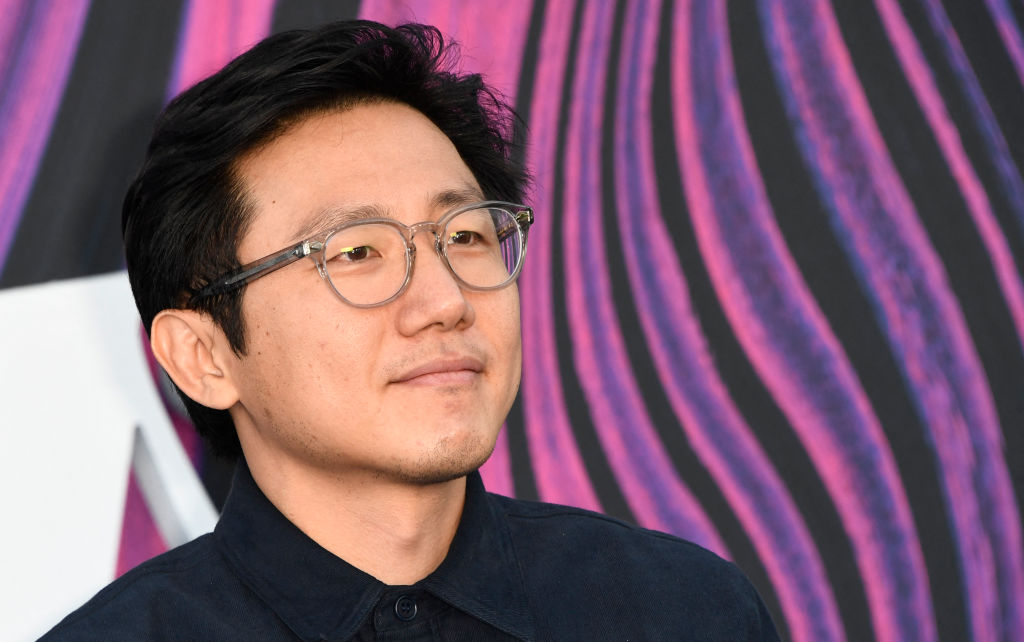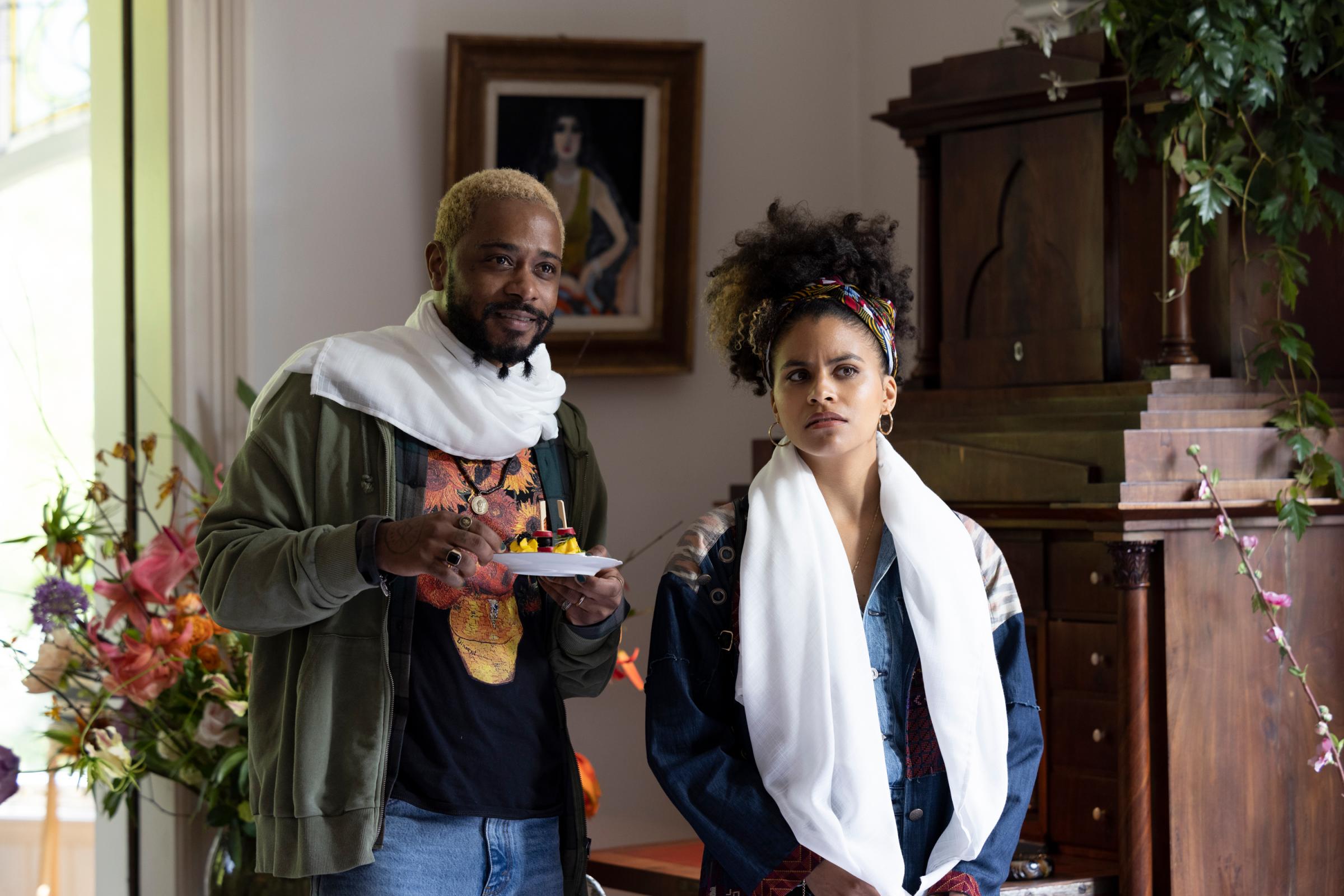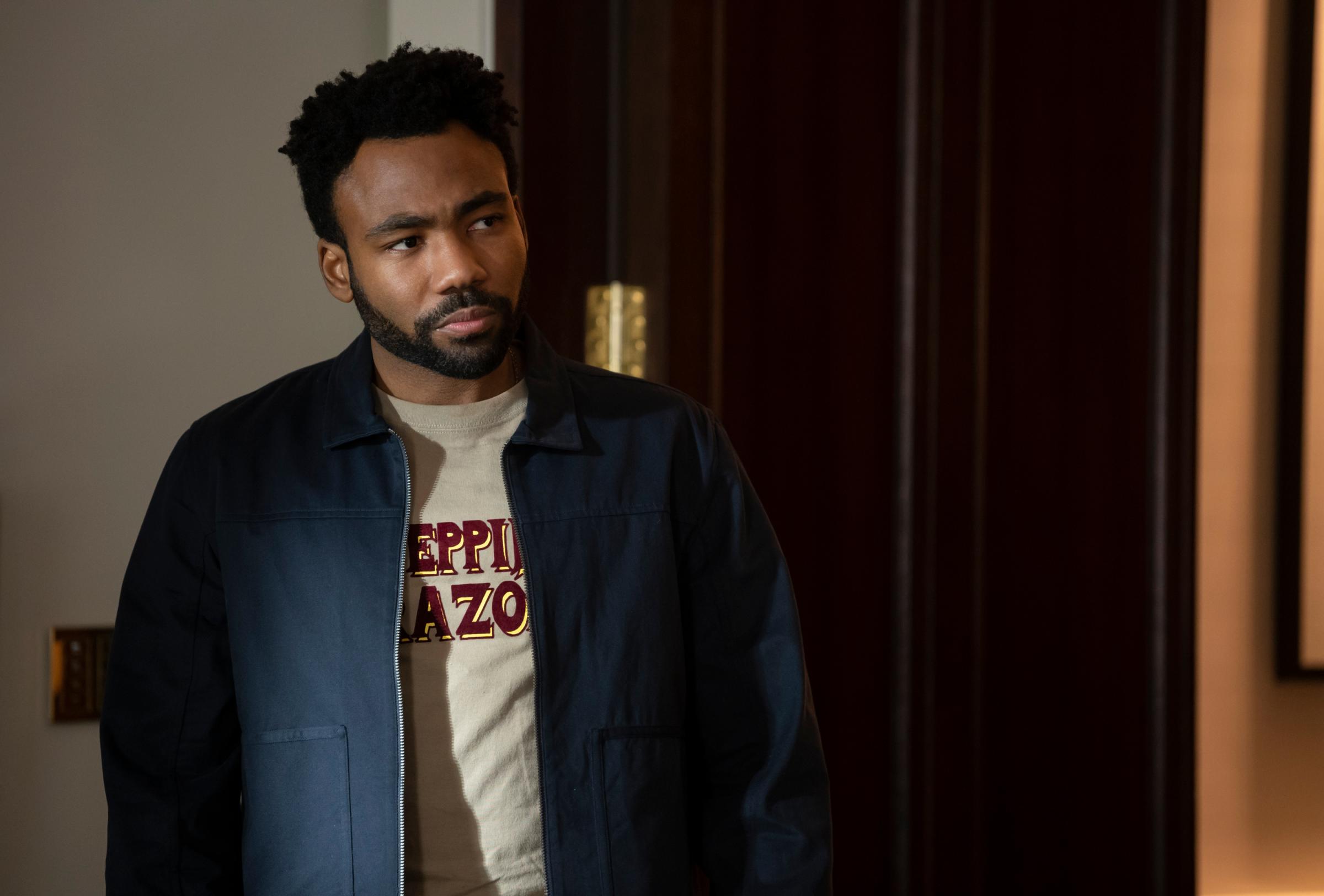
In the early 2010s, Hiro Murai was a Los Angeles-based music-video director, working regularly with the local Odd Future music collective—which included Frank Ocean, Earl Sweatshirt, and Tyler, the Creator, among others—as well as making the occasional video for musicians like Death Cab for Cutie, Usher, Lupe Fiasco, St. Vincent, and the Shins. Much of his work was strange, in the best way—his 2012 video for Earl Sweatshirt’s “Chum” featured a frog as a stand in for the rapper. (Murai still has the frog, which he named FDR, short for Frog Delano Roosevelt.)
But it was the actor Donald Glover, who also performs as the artist Childish Gambino, who approached Murai with the “weirdest prompt” he’s ever received. Glover wanted to make a “semi-documentary,” shot on film, about the making of his album, Because the Internet. The resulting 24-minute short film, Clapping for the Wrong Reasons, wrapped in a fictional element and was “a little weird and surreal, and kind of deadpan,” Murai says. Instead of following an actual musical track, the film explored the idea of a song through a meandering narrative, with demos of a beat heard in scenes set in a home studio, and lyrics tested out in freestyle sessions on living room couches and in front of a backyard campfire. It also featured Glover standing in front of a bathroom mirror, pulling a grotesque and unexplained length of string from his nose. The video has over 10.3 million views on YouTube.
That straight-faced embrace of the weird and offbeat has come to define much of Murai’s work in the last decade. Though Murai had no television credits at the time, Glover brought the filmmaker onto his surrealist comedy Atlanta, which, at first, seemed to be a traditional narrative show about Glover’s character Earn, a college dropout trying to launch the rap career of his cousin Alfred, a.k.a. Paperboi (Brian Tyree Henry). The series soon took the form of an unpredictable, uncanny fever dream where plot served mostly as a blank canvas enabling Atlanta’s writers, cast, and crew to push the boundaries of serial storytelling and explore all corners of the Black experience. Throughout its three seasons, Atlanta has veered from absurdist comedy to surrealist thriller to psychological character study, the narrative logic more akin to an ocean tide than a downhill stream. Murai—who has directed 20 of the 31 episodes of Atlanta, including its first five and the series-shaping finales of season 1 and 2—has been a key player in making the show what it is. He’s brought a genre-bending technique to its creation, helping it become one of the most unpredictable and most lauded examples of serial storytelling on TV right now.
Murai, 39, has proven his versatility, becoming a guiding mind behind equally celebrated shows like HBO’s ongoing series Barry, a dark comedy about a contract killer trying to break into Hollywood, co-created by and starring Bill Hader, and 2021’s Station Eleven, a critically-acclaimed, limited-series adaptation of author Emily St. John Mandel’s prescient novel about the aftermath of a world-ending pandemic. The latter, which came out during some of the worst days of the COVID-19 crisis, could easily have leaned into the nihilism of its genre and played on the anxieties of the moment. Instead, it was affirming. “It isn’t really about death; it’s about rebirth,” Murai says. “It’s about people not just surviving, but assessing what they need to be fully human—it’s about art and community.” Next, he’ll direct two episodes of the highly anticipated Mr. and Mrs. Smith remake, another Glover project.
Read More: Atlanta’s Unsparing Season 3 Premiere Is Worth the 4-Year Wait
Now Murai is reflecting on another season of the show that brought him to TV. After a nearly four-year pause between its second and third seasons, Atlanta returned to FX in March 2022 and aired its season finale on May 19. Even for a show built on unpredictability, the third season was notably dismissive of serial storytelling norms, with the main cast not even appearing in half the episodes, and multiple one-off stories delving into complex topics, like reparations for slavery and the perception of Blackness around the world. Its finale, directed by Glover with Murai on the production team, was as disconcerting and divisive as the other nine episodes this year.
Prior to the end of the season, Murai spoke to TIME about the Atlanta team’s creative process, why season 3 was so different from the two that came before, and how the TV landscape has changed since the show first premiered.
The third season is mostly set in Europe, and even the episodes that are set in the U.S. are either explicitly not in Atlanta, or are geographically vague. What was behind the decision to move physically outside of Atlanta—for a show called Atlanta?
At the end of season 2, they leave for Europe, and it was specifically about Paperboi, who had never left Georgia, going to a new continent. Season 3 is not necessarily that same trip, but the idea of Paperboi seeing his life in Atlanta in hindsight and figuring out where he is now that he’s an internationally known rapper, and what success means to him—all those were really interesting things to us.
Atlanta has always posed questions about racial dynamics and identity in the U.S. This season, those questions rose even more to the forefront in episodes like Rich Wigga, Poor Wigga, about the conflicts between internal and external perceptions of “Blackness” in America, or The Big Payback, about a white man getting sued for reparations, or White Fashion, in which multiple white characters co-opt aspects of Black culture for financial gain. But because the show leaves the U.S. geographically, I’m curious: what should viewers make of that?
A lot of the conversations about Europe came from Donald and his brother [Stephen Glover, who both writes for Atlanta and collaborates musically with Childish Gambino] touring in Europe. But also, as two kids from Atlanta, nothing makes you realize what’s going on—what happened in your upbringing—more than stepping outside of it. You learn a lot about who we are as Americans by leaving America. A lot of the things that feel super pointed about season 3 are due to the fact that the contrast is sharper. In the previous seasons, race is always there as a conversation, but it was about Black people being around other Black people. Having to face being surrounded by European white people is a different dynamic.

Atlanta has never been afraid to leave the main characters and primary narrative behind, but this season took it to a new level, with four of the 10 episodes not including Earn, Paperboi, Earn’s partner Van (Zazie Beetz), or the crew’s resident eccentric Darius (Lakeith Stanfield) at all. How did you end up with so many anthology episodes?
It just felt like the best way to tell this story was these weird little offbeat parables.
There were conversations about, “Is this a bad idea? Will people be upset that they’re not seeing Paperboi in the show they love?” But at the same time, I feel like this whole show is built on us doubling down on weird impulses and trying to make something different each time. I don’t think we’ve ever really enjoyed setting up a format and just coloring inside those lines.
It was a little scary, but it was also really exciting. How do you take this perspective of the show, and the state of mind, and then apply it to these different stories in different locations? Can Atlanta still be Atlanta if Paperboi is in Amsterdam, or Van is in Paris? Season 3 was very much about us pushing ourselves out of our comfort zones.
Tell me about how the process of making Atlanta differs from traditional TV.
I had literally never worked in television before Atlanta. Donald has a long history of working in writers rooms, but everybody else in that writers’ room, they weren’t even writers. We ended up making a lot of choices that you just shouldn’t make in television, both in story and execution. We immediately started letting our minds run wild; we were like, “Oh, what if each episode was a short film, and it took place in all these different locations, and we met new characters every episode, and we built it out that way?” Then when we executed it, it became this sort of crazy indie film grind, where each episode we had to build from whole cloth, from scratch. It’s extremely difficult because we’re working with a TV budget, but it’s also very fulfilling.
It’s now fairly normal for TV shows do the sorts of things Atlanta pioneered in TV production—featuring uncanny characters that may or may not be real or veering away from the protagonist to follow what previously felt like a tertiary character. What has your experience been seeing season 3 air now in this new context that you helped create?
Atlanta has always been a weirdly personal show for everyone who makes it. Season 1 was this thing that nobody cared about—it was just us messing around. When it hit and people liked it, we were taken aback, and season 2 became a story about us dealing with the accolades and [how] all of a sudden all the actors are famous and getting stopped in the street and, you know, all the discomfort and anxiety that comes out of that.
It’s always been like a therapy session for everybody who makes it. Obviously we are conscious of the audience, but first and foremost, we do it for us. So yes, we were aware of the change in the TV climate and what people expect out of a TV show. Also, politically, it’s a completely different atmosphere—the last season was in 2018. But we stuck to the credo that we’re here to work our own sh-t out and express ourselves and our anxieties and the topics that have been in our heads, and then hopefully, people will click in and connect to that. It’s not about trying to keep the show exactly as we remember it in 2018. Because we’re not the same people that we were in 2018.

The discourse around Atlanta season 3 has largely focused on how long it took to come out. In the season’s first episode, there’s a callback to a scene from the pilot, when Earn wakes up and recounts a nightmare to Van. The new season starts with almost exactly that nightmare. Did you intentionally put flags in there to acknowledge or reference the time that’s passed?
We tried to make the show very rewatchable, so you can just drop into any episode. Donald came from classic sitcoms. We’re still kind of doing a Seinfeld thing: We always like to approach it as though you’re just there for that episode.
So it’s not that important to us whether you get the reference, but if you love this show enough, and you rewatch the seasons, and you’re kind of in the world of the show, you’d get an extra layer of appreciation for it.
What have you watched or read recently that you would recommend?
The thing I’ve read most recently that I’ve been completely obsessed with—that I’ve bought for all the editors and DPs that I work with, is the George Saunders book, A Swim in a Pond in the Rain. The book is him reading five or six Russian short stories and deconstructing them to talk about storytelling. For anyone who works in the craft of storytelling, the book is a gift.
This interview has been condensed and edited for clarity.
More Must-Reads from TIME
- Cybersecurity Experts Are Sounding the Alarm on DOGE
- Meet the 2025 Women of the Year
- The Harsh Truth About Disability Inclusion
- Why Do More Young Adults Have Cancer?
- Colman Domingo Leads With Radical Love
- How to Get Better at Doing Things Alone
- Michelle Zauner Stares Down the Darkness
Contact us at letters@time.com